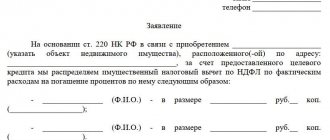What is installment execution of a decision?
Installment of execution of a court decision means that the requirements contained in the writ of execution will be fulfilled in parts, step by step, within the time limits established by the court. To provide an installment plan under a judicial act, you must submit a petition according to our sample. And precisely to the court, and not to the bailiff. If we are not talking about a judicial act, the interested person submits a petition to the body (official) that adopted the relevant act.
The court may grant an installment plan due to the difficult financial situation of the defendant, which does not allow him to pay the entire amount awarded by the court in a lump sum. But there must be conditions when the debtor can pay the amount in equal parts, for example, monthly.
When applying for an installment plan, it is necessary to take into account that the court will strive to maintain a balance of interests of the creditor and the debtor. In any case, the decision must be executed within a reasonable time. Therefore, installment plans for more than 1-1.5 years are practically not used. Therefore, the maximum period for granting an installment plan for the execution of a court decision is 1.5 years. This should be taken into account when drawing up an application, because it must be justified. We advise you to write a maximum period of 1.5 years, and count on a period of no more than 1 year.
It is necessary to distinguish between requirements for granting installment plans and deferment of execution of a court decision. These actions have similar beginnings, but have different consequences.
Pledge of goods during deferred payment: how to protect the interests of the seller
— What demands can the seller make against the buyer if he does not receive payment for goods sold on credit?
— How to convince the court that it is possible to foreclose on goods sold on credit
A pledge legal relationship can arise by force of law, that is, without any agreement (agreement) on the pledge. This is possible if the law stipulates which property and to ensure the fulfillment of which obligation is recognized as being pledged (clause 3 of Article 334 of the Civil Code of the Russian Federation).
In particular, the law provides for a pledge in case of sale of goods on credit (Clause 5 of Article 488 of the Civil Code of the Russian Federation). It is clear that thereby the Civil Code of the Russian Federation protects the interests of the seller. But in practice, difficulties arise with the application of this rule, namely with what requirements the seller can present to the buyer.
When a mortgage sale arises by operation of law
Judicial practice proceeds from the fact that a pledge when selling goods on credit is considered to arise when two conditions are simultaneously present:
— the condition for deferred (installment) payment is expressly provided for in the purchase and sale agreement;
- ownership of the goods passes to the buyer before payment of the entire amount of the goods.
Everything is clear with the first condition - such a requirement directly follows from clause 5 of Art. 488 of the Civil Code of the Russian Federation[1]. With the second, not everything is so obvious, but its validity can be illustrated with specific examples.
Let's assume that the parties have established an additional clause: we transfer the goods now, and ownership passes to the buyer only after full payment. In such a case, no security deposit arises. After all, although the goods are physically already in the possession of the buyer, legal ownership remains with the seller. Meanwhile, according to paragraph 2 of Art. 355 of the Civil Code of the Russian Federation “the pledgor of a thing can be its owner or a person who has the right of economic management over it.” If in such a situation the buyer does not fulfill his obligation to pay for the goods, the seller can only demand the return of the goods still in his possession.
Another example: the purchase and sale agreement provides for a condition for payment in installments (sale on credit), but the moment of transfer of ownership of the goods is not defined. What are the consequences?
In this case, the general rule applies, namely paragraph 1 of Art. 233 of the Civil Code of the Russian Federation: “the right of ownership of the acquirer of a thing under a contract arises from the moment of its transfer.” The general norm is echoed by a special one (clause 1 of Article 458 of the Civil Code of the Russian Federation). An exception to the general rule is when the law connects the transfer of ownership with the moment of state registration.
Practice. The buyer of the enterprise did not fully transfer the amount of payment under the contract, and the transfer of ownership of the enterprise was not registered. The court of first instance satisfied the seller's demands to collect the debt by foreclosure on the collateral - the enterprise as a property complex. However, higher authorities left this decision in force only in terms of satisfying the requirements for debt collection: “... the appellate court correctly overturned the decision of the first instance court in terms of foreclosure on the subject of collateral, citing the fact that the transfer of ownership of the disputed real estate to did not occur to the buyer, therefore, the pledge of this property did not arise by force of law”[2].
**end of example**
Risks the seller may face
From the above, the following rule follows: if ownership has passed to the buyer and he has been granted a deferred payment (installment plan), the seller has an additional guarantee. He may require the buyer to transfer the balance of payment for the goods, and this is the seller’s right by virtue of clause 5 of Art. 488 of the Civil Code of the Russian Federation is automatically secured by a pledge.
However, some courts interpret the law differently and stubbornly believe that even if both of the above conditions are present, the seller cannot obtain foreclosure on the pledged goods; he only has the right to demand payment for the goods or its return.
This approach is caused by the difficulty of interpreting how the provisions of clauses 3 and 5 of Art. relate to each other. 488 Civil Code of the Russian Federation.
Paragraph 3 of this article states: “In the event that the buyer who has received the goods does not fulfill the obligation to pay for them within the period established by the purchase and sale agreement, the seller has the right to demand payment for the transferred goods or the return of unpaid goods.”
Clause 5 provides for the rule that was mentioned above: “Unless otherwise provided by the purchase and sale agreement, from the moment the goods are transferred to the buyer and until payment, the goods sold on credit are recognized as being pledged to the seller to ensure the buyer fulfills his obligations for payment for goods."
Some courts have interpreted these provisions as follows.
The court's position. “In the statement of claim, the seller demanded payment for the equipment transferred to the defendant, which does not contradict the rules of paragraph 3 of Article 488 of the Civil Code of the Russian Federation on the seller’s right to demand payment for the goods sold or the return of unpaid goods.
As for the plaintiff's request to foreclose on the pledged equipment, it is not based on the law.
The plaintiff's reference to Articles 348, 349 of the Civil Code of the Russian Federation to the legal relations that arose between the parties under the purchase and sale agreement is not legal, since the fulfillment of the said obligation was not secured by a pledge in accordance with the requirements provided for in Chapter 23 of the Civil Code of the Russian Federation.
The provisions of paragraph 5 of Article 488 of the Civil Code of the Russian Federation, that goods sold on credit are recognized as being pledged by the seller for the buyer to fulfill his obligation to pay for the goods, allow the seller, in the event of non-payment for the goods, to demand the return of the goods.
In this regard, the plaintiff has no grounds for filing a claim to satisfy the claim by foreclosure on the pledged property”[3].
**end of example**
Thus, the courts essentially come to the conclusion that in paragraph 5 of Art. 488 of the Civil Code of the Russian Federation, we are talking about some “other” pledge, not a pledge according to the rules of Chapter 23 of the Civil Code of the Russian Federation.
... Of course, it may turn out that the requirement for payment or return of the transferred goods in your case will be sufficient to protect the interests of the seller. However, it is obvious that the possibility of foreclosure on the mortgaged property still represents a more serious guarantee. It will be of greatest importance if the buyer turns out to be insolvent (bankrupt) or enforcement proceedings are initiated against him at the claim of another (unsecured) creditor. But even outside the framework of such situations, the question of choosing the appropriate requirement for the plaintiff may turn out to be important from the point of view of the duration of the process and the likelihood of prompt execution of a judicial act (see the previous example).
Why do the courts refuse to apply this guarantee and are there any explanations from higher authorities on this issue?
There is no single position at the level of the Supreme Arbitration Court of the Russian Federation
The decision of the Federal Antimonopoly Service of the North-Western District, which was discussed in the above example, was appealed to the supervisory authority. However, the panel of judges of the Supreme Arbitration Court of the Russian Federation did not see any grounds for transferring the case to the Presidium. At the same time, the judges substantiated the legality of the approach described above in more detail.
The first position of the Supreme Arbitration Court of the Russian Federation . “Clause 3, 5 of Article 488 of the Civil Code of the Russian Federation establishes that in the event that the buyer who has received the goods does not fulfill the obligation to pay for it within the period established by the sales contract, the seller has the right to demand payment for the transferred goods or the return of unpaid goods.
Unless otherwise provided by the purchase and sale agreement, from the moment the goods are transferred to the buyer and until payment, goods sold on credit are recognized as being pledged by the seller to ensure the buyer fulfills his obligation to pay for the goods.
However, a pledge is one of the ways to secure an obligation and is an agreement between the debtor and the creditor, concluded in accordance with the requirements of Chapter 23 of the Civil Code of the Russian Federation.
No evidence has been provided that such a relationship has arisen between the parties, and therefore the demand for foreclosure on the collateral is unfounded”[4].
**end of example**
It is interesting that at the level of “refusal” definitions of the Supreme Arbitration Court of the Russian Federation one can also find the opposite approach.
Second position of the Supreme Arbitration Court of the Russian Federation. “According to paragraph 3 of Article 334 of the Civil Code of the Russian Federation, a pledge arises by virtue of an agreement. A pledge also arises on the basis of the law upon the occurrence of the circumstances specified therein, if the law stipulates what property and to ensure the fulfillment of what obligation is recognized as being pledged.
The rules of the Civil Code of the Russian Federation on a pledge arising by virtue of an agreement are correspondingly applied to a pledge arising on the basis of law, unless otherwise provided by law.
From the systematic interpretation of these legal norms it follows that the legislator provides equal protection of the rights and interests of mortgagees, regardless of the basis for the emergence of the pledge (by virtue of an agreement or pledge)”[5].
**end of example**
What happens? As the judges say, “from the literal interpretation of the law” it follows that bail arises automatically by force of law. It’s not for nothing that in paragraph 5 of Art. 488 of the Civil Code of the Russian Federation, the phrase “recognized as being pledged” is used - thereby establishing a presumption of the occurrence of a pledge. But why then do many courts (including judges of the Supreme Arbitration Court of the Russian Federation) come to the conclusion that some additional evidence is needed, and in fact require a pledge agreement signed by the parties?
Unfortunately, this position is only an echo of one of the approaches that developed in judicial practice back in 2005–2006.
Practice. “The cassation court considers that the plaintiff’s reference to Articles 348, 349 of the Civil Code of the Russian Federation to the legal relations that arose between the parties under the purchase and sale agreement No. 021-986 is illegal, since the fulfillment of the said obligation was not secured by a pledge in accordance with the rules provided for in Chapter 23 Civil Code of the Russian Federation. When concluding the purchase and sale agreement No. 021-986, the parties did not agree on the procedure for foreclosure on the mortgaged property and the initial sale price for its sale”[6].
**end of example**
Because of such oddities, it is not surprising that some lawyers doubt (and reasonably doubt): does a lien even arise by force of law? There was even an article published called: “Are collateral relations established by force of law on the basis of paragraph 5 of Article 488 of the Civil Code of the Russian Federation?”[7]
Reform of the Civil Code of the Russian Federation
Can we hope that civil law reform will solve the problem? The sensational Concept for the Development of Civil Legislation of the Russian Federation[8] sets the main direction: “It is necessary to streamline the pile of poorly coordinated norms on pledge that has formed in the legislation.” An entire section of the Concept is devoted to these standards: “8. Mortgage and other registered (recorded) lien rights.” Alas, about collateral by force of law in general, as well as about a particular case (the ratio of collateral and sales on credit) - nothing, silence and silence.
The authors of the Concept can be understood. Those who have read it will appreciate the scope. We are talking neither more nor less, but about a global reform, comparable in scale only to the adoption of a new civil code. To little things like “pledge by force of law” - and with such a scope these are really little things - the authors simply might not have gotten around to it...
Practical recommendations
Theory is theory, but from a practical point of view, the most pressing question is: how to protect yourself from a situation where, in the event of a dispute, the court suddenly decides that “no security has arisen”?
If you are already participating in a lawsuit and protecting the interests of the seller (despite the fact that the purchase and sale agreement itself was drawn up without your participation), you should refer to the need for a literal interpretation of clause 5 of Art. 488 Civil Code of the Russian Federation. At the same time, you can provide the court with references to the practice according to which the legislator provides equal protection of the rights and interests of pledge holders, regardless of the basis for the occurrence of the pledge.
Defense tactics. First of all, this is the above-mentioned determination of the Supreme Arbitration Court of the Russian Federation dated 04/07/2009 No. VAS-3800/09. There are also decisions of the courts of cassation, which note that in such a situation the goods may be subject to foreclosure: “The conclusion of the court of appeal that the inclusion in Art. 488 of the Code, paragraph five, is aimed specifically at ensuring the possibility of returning goods from the buyer in the event of non-payment by the buyer, contradicts the literal reading of this rule, according to which, as noted above, goods sold on credit are recognized as being pledged to the seller to ensure the buyer fulfills his obligations for payment for goods"[9].
**end of example**
If you are involved in the development of contracts, you can provide additional guarantees. First of all, to the two conditions for the emergence of a pledge, a third should be added. Namely: the collateral must be individualized.
Surprised? It would seem that this is a common truth. After all, the law plainly says: “The pledge agreement must indicate the subject of the pledge and its valuation, the essence, size and deadline for fulfilling the obligation secured by the pledge” (clause 1 of Article 339 of the Civil Code of the Russian Federation). But it is important to remember this rule even when there is a lien by force of law. There are quite a few judicial acts that say that collateral for a commercial loan did not arise due to the banal absence of an object in the agreement. Such cases occur even at the level of the Supreme Arbitration Court of the Russian Federation.
A typical case. “Having assessed the terms of the agreement dated December 25, 2007 No. 74/08-39/3 and the evidence presented, including invoices dated September 15, 2008 No. 8593663 and No. 8593709, the courts of first and appellate instances came to the conclusion that there was no reason to consider the pledge arose in force of law.
At the same time, the courts took into account that in the contract dated December 25, 2007 No. 74/08-39/3, the goods to be transferred, and, accordingly, those that are pledged until full payment, are not identified”[10].
**end of example**
If someone takes the thesis “the subject of collateral must be individualized” for granted, and the author of this article is a person who explains the obvious, then do not rush to conclusions. Once again, re-read the quote from the definition of the Supreme Arbitration Court of the Russian Federation given in the example. It seems that the parties had an agreement and invoices, but “the goods are not identified.” Why?![11]
Be that as it may, the clearest possible description of the subject of the contract increases the chances that in court it will be possible to prove the occurrence of a pledge by force of law. In this case, the position of the Supreme Arbitration Court of the Russian Federation will indirectly testify in your favor.
Finally, an additional guarantee can be provided by the most detailed terms of the contract - not only in terms of its subject matter, but also in terms of the terms of sale on credit. It is necessary to directly indicate in the contract that the goods are pledged by the seller until payment is made, that this pledge secures the fulfillment of the buyer’s obligation to pay for the goods, and also describe the procedure and conditions for foreclosure on the pledged goods.
[1] Sometimes the court still has to explain obvious things to the parties. Thus, the Federal Antimonopoly Service of the North-Western District, in a resolution dated January 21, 2010 in case No. A56-33476/2009, refused to satisfy claims for foreclosure on property in a situation where the buyer (defendant) did not fully pay for the goods delivered, but the contract itself provided for the delivery of goods on the basis of 100% prepayment. Court about.
[2] Resolution of the Federal Antimonopoly Service of the Ural District dated May 3, 2006 No. F09-2623/06-S3 in case No. A60-34154/2005.
[3] Resolution of the Federal Antimonopoly Service of the North-Western District dated January 18, 2008 in case No. A56-15665/2007.
[4] Determination of the Supreme Arbitration Court of the Russian Federation dated April 14, 2008 No. 4738/08.
[5] Determination of the Supreme Arbitration Court of the Russian Federation dated 04/07/2009 No. VAS-3800/09.
[6] Resolution of the Federal Antimonopoly Service of the West Siberian District dated February 28, 2006 No. F04-9791/2005(18897-A81-11) in case No. A81-2346/2005.
[7] Korshunova Zh.V., Maryankova N.V. // Arbitration disputes. 2010. No. 3. P. 123-134.
[8] Approved by the decision of the Council under the President of the Russian Federation for the codification and improvement of civil legislation dated October 7, 2009 (Bulletin of the Supreme Arbitration Court of the Russian Federation. 2009. No. 11).
[9] Resolution of the Federal Antimonopoly Service of the Ural District dated December 15, 2009 No. F09-9301/09-S2 in case No. A76-11443/2009-32-120.
[10] Determination of the Supreme Arbitration Court of the Russian Federation dated May 13, 2010 No. VAS-5585/10.
[11] It is interesting that other courts do not require individualization of the subject of pledge almost at the molecular level: “Thus, to conclude that the parties to the agreement on the pledge of its subject are in agreement, it is sufficient to indicate the generic, rather than individualizing characteristics of the goods, as well as the determination by the parties of the total value pledged goods" (rulings of the Second Arbitration Court of Appeal dated August 13, 2009 and the Federal Antimonopoly Service of the Volga-Vyatka District dated October 30, 2009 in case No. A29-2245/2009). True, in this case we were talking specifically about the pledge agreement.
How to draw up an application for installment execution of a court decision
The application for installment plan is drawn up in free form according to the sample below. The document must contain information about the applicant, the court decision, and the grounds for granting installment plans. As grounds, you need to indicate your financial situation, that is, indicate your average monthly income and expenses. To calculate income, it is better to take average income for 1 year. If income has decreased recently, you need to indicate the amount taking into account the reduced income. To justify expenses, the cost of living and the presence of dependents (minor children, elderly parents) should be taken into account.
You should not base the deferment requirement on the presence of a large number of credit obligations or debts under other executive documents. In this case, the court will not give preference to some creditors over others.
What documents are needed for installment plan
To the application for granting an installment plan for the execution of a court decision, the applicant must attach documents that confirm their financial situation. And evidence that the obligation can be fulfilled in parts. Such evidence includes certificates of the amount of earnings or other income that is paid in periodic payments.
You can attach the children's birth certificate or a guardianship order as proof of expenses. You can attach receipts for expensive treatment and other documents.
In general, the list of documents for installment payment is not established anywhere. Considering the arguments presented in the application, attach supporting documents. That is, each justification for the installment plan must be documented. Talk about income - attach a certificate confirming it. Talk about expenses - attach the relevant documents. It is clear that there is no point in confirming, for example, expenses for food, clothing and other daily needs. These expenses are covered by the concept of a living wage. It is necessary to confirm the individual expenses that are unique to you personally.
Consideration by the court of the issue of installment decision
The debtor's lack of funds to execute the court decision is not a basis for granting an installment plan. In this case, the bailiff has the right to foreclose on the defendant’s property. After all, execution of a court decision is possible through the sale of this property.
An application for an installment plan is considered by the court that made the decision in the case. An application for installment plan is not paid with state duty. As a general rule, the court considers the application without a court hearing or summoning the parties. However, the court has the right to schedule a meeting and notify the participants (this most often happens). But the appearance of the parties at the consideration of the application in such cases is not obligatory. All persons who took part in the case are indicated as interested parties. In addition, a bailiff.
An application for installment payment is submitted to the court in free form; there are no special requirements for its content. However, when submitting an application, we recommend that you adhere to the template posted on the website.
What does a cash loan agreement include?
The contract specifies such parameters as the amount, the absence of interest on the use of funds or their availability, the term and conditions of return. The purpose of the loan is also often described (for example, the presence of an indication “for family needs” directly indicates that not only the borrower, but also his spouse is responsible for the repayment of funds). The Civil Code of the Russian Federation (Article 395) also describes other circumstances - the place of consideration of disputes, the deadlines for applying for the return of funds in court, the statute of limitations for such agreements (3 years), during which you can apply for the return of the loan.
Not required today:
- Drawing up an agreement with a notary (does not have any special force when considering disputes).
- Presence of witnesses when signing a cash loan agreement.
Sample application for installment execution of a court decision
In ____________________________ (name of court) Claimant: ___________________________ (full name, address)
Debtor: __________________
(full name, address) Interested parties: ___________ (full name, address)
Bailiff: _________________
(full name, address of the bailiff department) in civil case No. __________
Application for installment plan for execution of a court decision
“___”_________ ____ a court decision (ruling) was made on the claim of _____________ (full name of the plaintiff) to _____________ (full name of the defendant) about _____________________ (essence of the decision). Based on the writ of execution, bailiff _________ (full name) initiated enforcement proceedings No. __________ dated “___” ________ _____.
Currently, executing a decision at a time is difficult for the debtor because: _________ (give existing circumstances that make it difficult to execute a court decision at a time). I consider it reasonable and in the interests of the parties to execute the decision in parts, in installments, according to the following schedule: _________ (give a payment schedule, indicating dates and amounts, you can indicate monthly payments). _________ (give reasons to establish an installment plan).
Based on the above, guided by Articles 203, 434 of the Civil Procedure Code of the Russian Federation,
Ask:
- Provide an installment plan for the execution of a court decision on the claim of ________ (full name of the plaintiff) to ________ (full name of the defendant) about ________ (essence of the decision) in the following order: ________ (indicate when, what amounts will be paid).
List of documents attached to the application:
- Notification of sending (delivery) a copy of the application to the participants in the case
- Evidence of the existence of grounds for installment plan
Date of application “___”_________ ____ Signature _______
applications: Application for installment execution of a court decision
Example of a loan agreement between individuals
A specific example of an agreement can only be offered if both parties have decided on the method of formalizing the transfer of funds. This can be not only a loan agreement, but also a receipt for receipt of funds.
The required sections are:
- Subject of the agreement.
- Loan terms.
- Duties of the parties.
Example contracts vary depending on whether or not the following sections are included:
- moment of entry into force of the contract, its termination
- Force Majeure
- dispute resolution.
If the corresponding section is not in the contract, the court will be guided by the Civil Code of the Russian Federation when considering the dispute (for example, Articles 395, 809 and 810).









